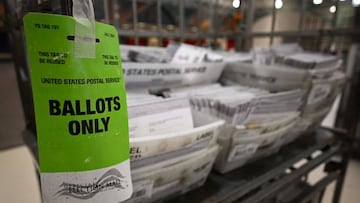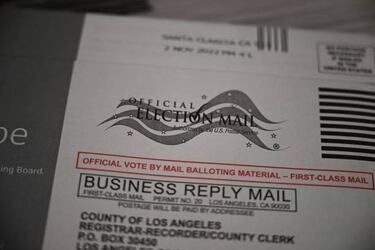2022 Midterm Elections: Where to vote in California? When do your designated polls open and close?
The Mid-Terms are just around the corner and candidates in California are making their final pitches to voters. Here is what you need to know.


Voters will have the chance to cast a ballot in critical races in the Golden State during the 2022 midterms with Election Day on 8 November. While Gavin Newsom is expected to be voted in for a second term, with his battle against Brian Dahle practically a forgone conclusion, the race between Matt Dorsey and Honey Mahogany for District 6 supervisor could go right down to the wire. There are also seven statewide propositions to be voted on, including two high-profile initiatives focused on casinos and gambling.
US midterm elections live online: Election Day | Latest news
According to the latest figures from Targetearly’s statewide 2022 Early and Absentee Vote Report, 3,880,015 ballots out of the 22.2 million that were issued have been returned and accepted in California with little over 24 hours left to go. The early vote figure stands at 17.1% - way down from the 2018 elections when 30.5% of the total votes counted statewide comprised early vote ballots.
Calif. Secretary of State Shirley Weber spoke on the accomplishments of her office and her goals for the future.
— KUSI News (@KUSINews) November 1, 2022
One of her main objectives has been to get Californians excited about the responsibility of VOTING.
More info: https://t.co/F405JBSrCP pic.twitter.com/PrMcwtxlqO
When is the deadline to register to vote?
The registration deadline for voting is 15 days before the election. However, if you miss the deadline to register to vote, you can still go to your county elections office, vote center, or polling place on or before Election Day to complete the conditional voter registration process (often referred to as “Same Day Voter Registration”). Those who are still looking to register must fill out the Same-Day Voter Registration form. Once this form has been submitted those looking to cast a ballot must request a ballot from the county election office or closest polling location. Any remaining questions about the registration process should be directed to the county election office. For more information, visit vote.ca.gov.
Will I be sent a mail-in ballot?
All registered voters in the state should have received a ballot that can be filled out and returned through the mail or dropped at a collection box. However, those who registered more recently may not receive their ballot and time and should identify their polling location to cast their vote.
All ballots must be postmarked by election day or delivered to a drop box or brought to a polling location on or before 8 p.m. on election day (8 November 2022) and received by 15 November 2022 at the latest. You can track your vote-by-mail ballot by signing up at WheresMyBallot.sos.ca.gov to receive text, email or voice status alerts.

California Leadership Races
Governor
- Gavin Newsom (D), incumbent
- Brian Dahle (R), State Senator
Lieutenant Governor
- Eleni Kounalakis (D), incumbent
- Angela Underwood Jacobs (R), former City Councilwoman of Lancaster, California
Treasurer
- Fiona Ma (D) [incumbent]
- Jack Guerrero (R), Councilmember, City of Cudahy
Controller
- Malia Cohen (D), Chairperson, California Board of Equalization
- Lanhee Chen (R), Fiscal Advisor and Educator
Insurance Commissioner
- Ricardo LaraIncumbent (D), incumbent
- Robert Howell (R), Business owner
Federal Level Elections
Thanks to districting, all congressional races are occurring in new districts. This may create some challenges for incumbents who are representing part of their previous district but also new residents who may not be as familiar with their work and policy positions.
US Senate Special and Normal Election
A special election to fill Vice President Kamala Harris’ seat through 2022 will be held at the same time as a normal Senate race to determine who will represent the state starting in January 2023 for the next six years.
When President Biden won the 2020 election, Gov. Gavin Newsom named Alex Padilla to serve in the seat left vacant by Vice President Kamala Harris. Padilla, who previously served as California Secretary of State, is expected to win both races. Padilla faces off against Republican challenger and attorney Mark P. Meuser.
Ballot Initiatives
There are a total of six ballot initiatives that residents will have the opportunity to vote for or against.
Proposition 1: Constitutional Right to Reproductive Freedom
Voters in California have the chance to add an amendment enshrining the right to abortion within the sate’s constitution. A vote YES would establish the right to abortion and the use of contraceptives in the state constitution, while a NO vote makes no changes to the document. The initiative is supported by the California Democratic Party as well as Planned Parenthood and is opposed by the California Republican Party.
Proposition 26: Allows In-Person Roulette, Dice Games, Sports Wagering on Tribal Lands.
There are a few propositions on the ballot this year that relate to the state’s gambling laws.
Prop 26 would make sports betting legal the state’s four horse racing tracks as well as at tribal casinos. In addition to sports betting, tribal casinos would also be able to offer roulette and other dice games, which are currently banned under state law. A vote YES allows for these changes to be made, while a vote NO would keep gambling laws the same.
Support for Prop 26 comes down to political party, with the California Democratic Party approves of the measure, believing that it could be a way to increase tribal sufficiency.
The California Republican Party, are joined by an unlikely ally in their opposition to Prop 26, Society for the Prevention of Cruelty to Animals, as well as various local humane societies. Animal rights activists see Prop 26 as a means to provide new life to the decaying horse racing industry and oppose any efforts to make racing more profitable.
Prop 27: Allows Online and Mobile Sports Wagering Outside Tribal Lands
This is the second of the two propositions related to gambling.
In 2018, the US Supreme Court gave states the power to determine their own laws in relation to online sports betting. Quickly, many states have enacted laws to allow for online sports betting as a way to increase their own tax revenue.
Two of the largest online platforms for sports betting, Draft Kings and FanDuel, have spent millions in the campaign to legalize betting in the Golden State.
The measure to legalize sports betting for those twenty and older outside of tribal lands would increase revenue with “those offering online sports betting would be required to pay the state a share of sports bets made.”
Unlike Prop 26, where Democrats and Republicans have differing opinions, on Prop 27, both parties disagree that the measure should be approved by voters. The only organizations that approve of its implementation are DraftKings, FanDuel, Major League Baseball, and three native tribes (fifty more oppose the proposition).
Prop 28: Provides Additional Funding for Arts and Music Education in Public Schools
Prop 28 moves away from the world of gambling and instead focuses on funding for arts and music programs in K-12 schools.
If approved, voters would allow the state to increase funding for education by one percent (funds could only be used for arts and music education) from the state’s General Fund which has a surplus of around $100 billion. Current state law mandates that all students, regardless of their district, receive some arts education, but the quality can vary widely with some districts allocating much more money on these programs. The funds for Prop 28 would be distributed to districts who lack the resources to improve their arts and music programs, making access to these subjects more equitable across the state.
A YES vote means that a person approves of this increased funding, whereas, a NO vote would keep funding at their current levels.
Prop 28 was endorsed by the California Democratic Party and, interestingly, there are no organizations who have voiced opposition to the measure.
Prop 29: Requires On-Site Licensed Medical Professional at Kidney Dialysis Clinics and Establishes Other State Requirements
Prop 29, which deals with staffing at kidney dialysis clinics, is similar to those that were voted down in 2018 and 2020. This measure would mandate that clinics have at least one doctor, nurse practitioner, or physician’s assistance on site when treatments are being administered.
Proponents believe that the change could decrease patient hospitalizations, while those opposed believe that increased staffing is an unnecessary cost that could put many privately owned dialysis clinics out of business.
The YES campaign is supported by the Service Employees International Union-United Healthcare Workers West, the California Labor Federation, and the California Democratic Party.
The NO campaign has been financed by private dialysis companies like DeVita and Fresenius Medical Care, and has also found support from the California Republican Party, the American Nurses Association, and the California Medical Association.
Prop 30: Provides Funding for Programs to Reduce Air Pollution and Prevent Wildfires by Increasing Tax on Personal Income Over $2 Million
Electric cars continue to gain popularity in the Golden State and Prop 30 would incentivize further demand for non-gas polluting cars by imposing a 1.75 percent income tax increase on those making more than $2 million a year. The funds collected, which the state estimates could total $4.5 billion, would be used to provide rebates for low and middle class families who purchase electric cars and expand charging infrastructure. About a quarter of the revenue would also be used to hire and train fighter fighter who are desperately needed as fire season grows longer and longer.
Related stories
The base of support for this proposition is a bit strange. While the proposition was endorsed by the California Democratic Party, Gov. Gavin Newsom opposes the tax increase, along with the state’s Republican Party as well as the California Teachers Association.
Prop 31: Referendum on 2020 Law That Would Prohibit the Retail Sale of Certain Flavored Tobacco Products
The last and final proposition on the ballot this year relates to state laws on the availability of certain tobacco products. Prop 31 was placed on the ballot after opposition to the implementation of a state law that outlawed the commercialization of tobacco products that have flavors that appeal to children including mango and cotton candy. A YES vote implies that a voter would like to see the prohibition on these products, whereas, a NO vote means one wishes to overturn the 2020 law and allow for these products to be sold.

